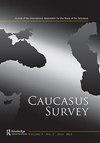沉默的声音:格鲁吉亚历史教科书的案例
IF 0.5
Q3 AREA STUDIES
引用次数: 4
摘要
社会科学和人文学科的多项研究强调了教科书在塑造集体记忆以及向新一代传播过程中的重要性。国家被认为是通过教科书传播的主导叙事形成的主要代理人。本文试图证明,公众舆论和判断是官方言论或政策的重要载体,旨在影响主流话语。在冲突后的社会中,更广泛的学术研究表明,沉默是一种遗忘,是讲述创伤故事的有效工具。沉默不仅是遗忘的一种形式,更是一种自给自足、独立的范畴,是一种刻意选择的记忆技巧。这是一种有意的无声说话策略。使用定性研究方法,我将我的论点建立在1993年至2018年六种最常见的格鲁吉亚学校历史教科书的文本分析上,重点关注与1992-93年阿布哈兹战争有关的章节。我提出了三种沉默:创伤性沉默、个性化沉默和受害沉默。这项研究促进了关于记忆动因的热烈讨论,以及个人、集体和官方记忆之间的相关性。它探讨了这些记忆对国家课程的影响。本文章由计算机程序翻译,如有差异,请以英文原文为准。
The voices of silence: The case of Georgian history textbooks
ABSTRACT Multiple studies in the Social Sciences and Humanities emphasize the importance of textbooks in shaping collective memory as well as the process of transmission to a new generation. The state is considered the main agent in the formation of dominant narratives transmitted through textbooks. This article attempts to demonstrate that public opinion and judgment are as such important vectors of the official rhetoric or policy meant to influence the prevailing discourse. In post-conflict societies, the wider scholarship suggests that silencing, a type of forgetting, is an effective tool when telling stories of traumatization. Silencing is not only a form of forgetting, but rather a self-sufficient, independent category, and a deliberately selected technique of remembering. It is an intentional strategy of voiceless speaking. Using a qualitative research method, I build my arguments on a textual analysis of the six most common Georgian school history textbooks from 1993 to 2018, focusing on chapters relating to the 1992–93 war in Abkhazia. I propose three types of silencing: traumatic, personalized and victimized. This study contributes to the vibrant discussion about memory agents, as well as correlations between individual, collective and official memory. It explores the impact of such memories on the national curricula.
求助全文
通过发布文献求助,成功后即可免费获取论文全文。
去求助
来源期刊

Caucasus Survey
Arts and Humanities-History
CiteScore
1.30
自引率
9.10%
发文量
4
期刊介绍:
Caucasus Survey is a new peer-reviewed, multidisciplinary and independent journal, concerned with the study of the Caucasus – the independent republics of Armenia, Azerbaijan and Georgia, de facto entities in the area and the North Caucasian republics and regions of the Russian Federation. Also covered are issues relating to the Republic of Kalmykia, Crimea, the Cossacks, Nogays, and Caucasian diasporas. Caucasus Survey aims to advance an area studies tradition in the humanities and social sciences about and from the Caucasus, connecting this tradition with core disciplinary concerns in the fields of history, political science, sociology, anthropology, cultural and religious studies, economics, political geography and demography, security, war and peace studies, and social psychology. Research enhancing understanding of the region’s conflicts and relations between the Russian Federation and the Caucasus, internationally and domestically with regard to the North Caucasus, features high in our concerns.
 求助内容:
求助内容: 应助结果提醒方式:
应助结果提醒方式:


